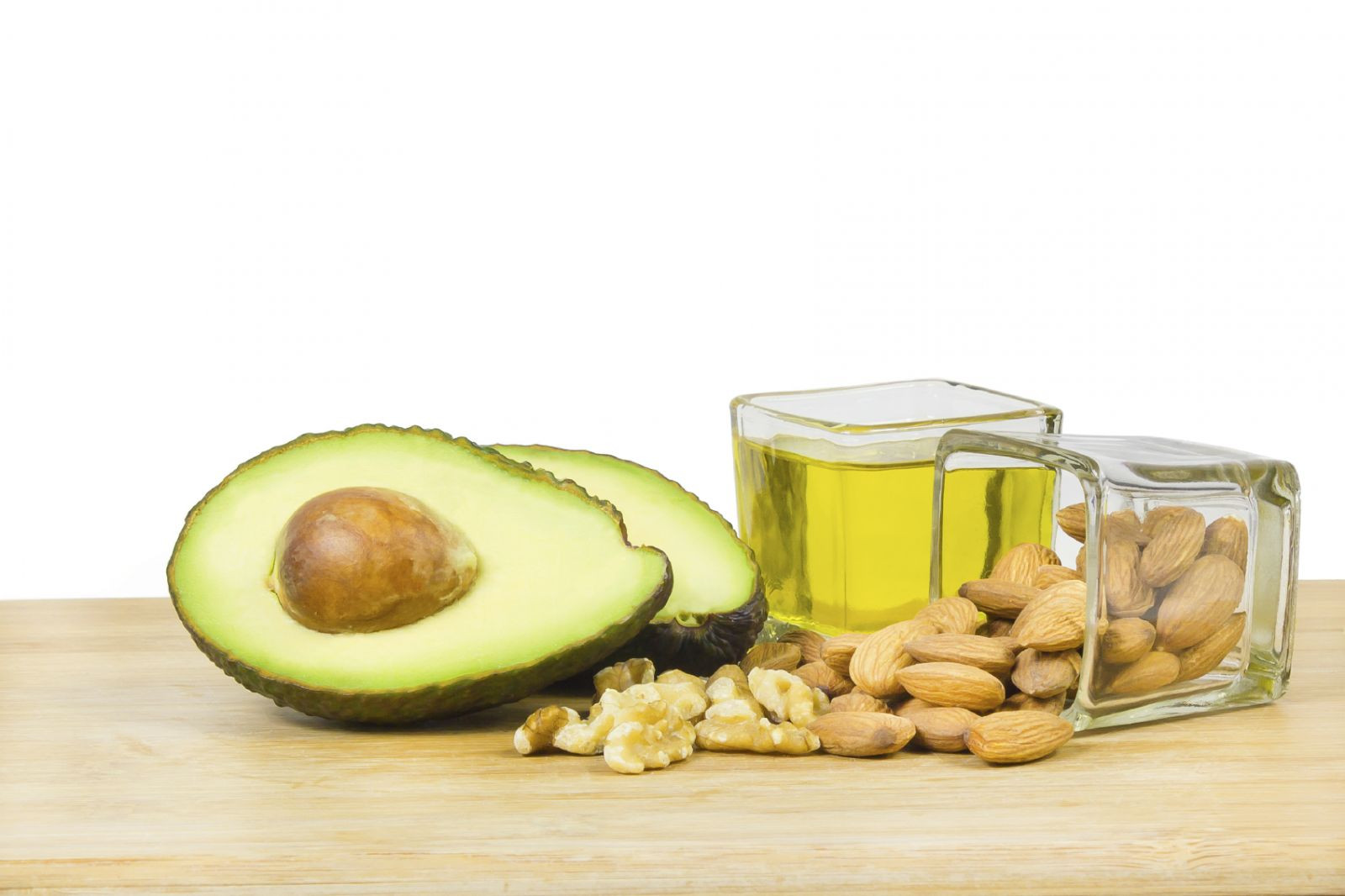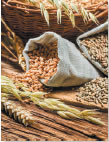
5 timeless habits for better health

What are the symptoms of prostate cancer?

Is your breakfast cereal healthy?

When pain signals an emergency: Symptoms you should never ignore

Does exercise give you energy?

Acupuncture for pain relief: How it works and what to expect

How to avoid jet lag: Tips for staying alert when you travel

Biofeedback therapy: How it works and how it can help relieve pain

Best vitamins and minerals for energy

Should you take probiotics with antibiotics?
Cholesterol Archive
Articles
Ask the doctor: Why is peanut butter "healthy" if it has saturated fat?
Q. I keep reading that peanut butter is a healthy food. But it contains saturated fat and has more sodium than potassium. That doesn't sound healthy to me. Is peanut butter good for you?
A. The presence of saturated fat doesn't automatically kick a food into the "unhealthy" camp. Olive oil, wheat germ, and even tofu — all "healthy" foods — have some saturated fat. It's the whole package of nutrients, not just one or two, that determines how good a particular food is for health.
Unscrambling the message on eggs
Advice about eating eggs has evolved over the years. Should you go easy on this popular protein source?
Over the years, eggs have taken a bit of a beating, starting in the late 1960s. That's when the American Heart Association advised people to cut back on cholesterol in their diets and to eat no more than three whole eggs a week.
Decades later, eggs got a break after studies suggested that for most people, an egg a day was A-OK for heart health. But a recent report cracked down on eggs once again, suggesting that we return to the yolk-rationed days of yore (see "No yolk: Eggs linked to slightly higher risk of heart disease").
New insights about inflammation
Recent research reignited interest in inflammation, a major player in heart disease.
A buildup of cholesterol-rich plaque inside arteries — known as atherosclerosis — is the root cause of most heart attacks and strokes. Researchers have long recognized that chronic inflammation sparks this artery-damaging process (see "Understanding inflammation"). Now, they're zeroing in on better ways to tackle that aspect of the problem.
Addressing inflammation is vital. Even when people take steps to lower their risks for heart disease, such as reducing their cholesterol and blood pressure, they may still face life-threatening cardiovascular events.
For most people, no need for niacin
Research we're watching
Hundreds of thousands of people in the United States take prescription niacin (also known as vitamin B3) as part of a regimen to prevent heart disease. But a new analysis that was published April 12 in JAMA Network Open suggests this old drug offers no benefit for most people.
The analysis included 35,760 patients from 17 clinical trials documenting the effect of niacin on at least one cardiovascular disease outcome. About half of the people were taking niacin, and the remainder received placebo, usual care, or other lipid-lowering agents. Over all, niacin was not helpful in preventing any serious heart-related events, strokes, or deaths from heart disease.
Bust your belly for a healthier heart
If your abdomen looks like an apple (or a beach ball), it's a sign that something hazardous lies beneath.
What's a telltale sign of potential health problems? Look down. Whether you call it a potbelly or spare tire, this noticeable bulge can be more dangerous than you realize.
"It's common for men to put on a few extra pounds every year as they age, but they really should pay attention to increasing waist size," says Dr. Jody Dushay, an endocrinologist with Harvard-affiliated Beth Israel Lahey Health. "Any extra weight around the waist can be especially detrimental to your health."
Should you increase HDL, and how?
Q: What are the best ways to increase HDL (good) cholesterol levels?
A: Before I answer that question, why bother to increase HDL cholesterol at all? Many studies have found that people with low levels of HDL are at increased risk for heart attacks, strokes, and other complications of arteries diseased by atherosclerosis: that's why we call HDL the "good" cholesterol. Given that, you'd think that raising HDL levels would reduce a person's risk for atherosclerosis. Unfortunately, despite a lot of research, we don't yet know if that's true, nor how best to raise HDL levels.
The truth about dietary fat
For years, experts recommended low-fat diets as a way to lower cholesterol and heart disease risk. Today, we know that low-fat isn't the way to go after all. A healthy diet includes plenty of "good-for-you" fats — and limits the unhealthy ones. Current dietary guidelines recommend that you get 20% to 35% of your daily calories from fat. Even more may be fine, if you follow these simple guidelines.
Favor the "good" fats.
The best sources of healthy fats are oily, cold-water fish, such as salmon and tuna; plant sources such as avocados and nuts; and vegetable oils, such as olive, canola, soybean, and cottonseed oils. These fats promote heart health because they lower cholesterol levels — and they may even fight chronic inflammation, which may contribute to heart disease. It's okay to get up to 35% of your daily calories from fat — as long as most of it comes from sources like these.
Whole grains associated with longevity, say Harvard researchers
Regularly eating whole grains can help you lower “bad” cholesterol, triglycerides, and blood pressure. A diet rich in whole grains also “is associated with a lower risk of developing cardiovascular disease, type 2 diabetes, metabolic syndrome, and certain types of cancer,” says Dr. Qi Sun, an associate professor at Harvard Medical School.
In a study published in JAMA Internal Medicine, Sun and colleagues reported that eating whole grains may even extend your life. Sun used the diet information of more than 100,000 men and women whose health was followed for more than 20 years. The study found that those who regularly ate whole grains had a 9% lower overall death rate and a 15% lower death rate from heart disease.
Muscle aches from statins: Real, but sometimes imagined?
The "nocebo effect" may explain why some people believe they can't tolerate statins.
For more than 20 years, cholesterol-lowering statin drugs have been a mainstay for preventing and treating heart disease. But up to half of people prescribed these drugs are no longer taking them within a year or two. The reasons vary, but some people experience what they believe to be statin-related side effects — most often muscle pain. Others avoid statins altogether because of worries over side effects.
"Far too any people think they cannot tolerate statins when they actually can," explains Dr. Jorge Plutzky, director of preventive cardiology at Harvard-affiliated Brigham and Women's Hospital. To be clear, muscle problems are a known side effect of statins. However, serious muscle-related complications are extremely rare (see "What is rhabdomyolysis?"). And when people experience the more common — but less worrisome — muscle-related symptoms, those issues usually resolve with a lower statin dose or a change to a different statin, Dr. Plutzky says.
The age of statins
Healthy older adults ages 75 and older might not benefit from the drugs to protect against cardiovascular disease.
Image: © rogerashford/Getty Images
Cardiovascular disease is the leading cause of death for people ages 75 and over. The cholesterol-lowering statin drugs can help protect against heart attack or stroke, both for people who have already had one and those who are at high risk for one of these events.
But what if you are in this older age bracket and have no history of cardiovascular problems? Do you really need one of these cholesterol-lowering drugs to protect yourself from future heart attacks and strokes?

5 timeless habits for better health

What are the symptoms of prostate cancer?

Is your breakfast cereal healthy?

When pain signals an emergency: Symptoms you should never ignore

Does exercise give you energy?

Acupuncture for pain relief: How it works and what to expect

How to avoid jet lag: Tips for staying alert when you travel

Biofeedback therapy: How it works and how it can help relieve pain

Best vitamins and minerals for energy

Should you take probiotics with antibiotics?
Free Healthbeat Signup
Get the latest in health news delivered to your inbox!
Sign Up











